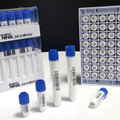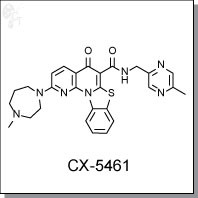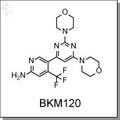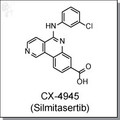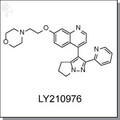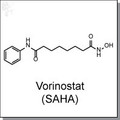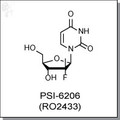 Loading... Please wait...
Loading... Please wait...- Home
- Disease Area
- Oncology
- CX-5461 | RNA Pol I inhibitor
- Home
- Cellular Mechanism
- Autophagy
- CX-5461 | RNA Pol I inhibitor
- Home
- Cellular Mechanism
- Metabolism
- DNA/RNA Synthesis
- CX-5461 | RNA Pol I inhibitor
Product Description
CX-5461 is a potent, orally bioavailable small molecule inhibitor of rRNA synthesis in cancer cells. It selectively inhibits rRNA synthesis by polymerase I (Pol I) in the nucleolus, but does not inhibit mRNA synthesis by RNA Polymerase II (Pol II), DNA replication or protein synthesis. (In tested cell lines, IC50s for Pol I range from 54nmol/L to 142nmol/L, IC50s for Pol II is higher than 25umol/L.)
CX-5461 exhibits a broad range of antiproliferative activity, with wild-type (wt) p53 cells derived from hematological malignancies being the most sensitive. (p53 wt solid tumors: median IC50=164 nM; p53 wt hematologic cancers cells: median IC50=25 nM). CX-5461 selectively kills cancer cells relative to normal cells. (Median IC50 in normal cells is 5,000 nM.) CX-5461 directly targets the initiation stage of rRNA synthesis, induces both autophagy and senescene, but not apoptosis in a p53-independent process in solid tumor cell lines. In wt p53 hematologic cancer cells, however, inhibition of Pol I results in nucleolar stress and release of ribosomal proteins (RP) from the nucleolus. The RP bind to Mdm2 and release p53 to cause apoptosis in cancer cells. CX-5461 exhibits potent in vivo antitumor activity against both human solid tumor in xenograft models, and leukemia and lymphoma in animal models [1-2].
Technical information:
| Chemical Formula: | C27H27N7O2S | |
| CAS #: | 1138549-36-6 | |
| Molecular Weight: | 513.61 | |
| Purity: | > 98% | |
| Appearance: | White | |
| Chemical Name: | 5H-Benzothiazolo[3,2-a][1,8]naphthyridine-6-carboxamide, 2-(hexahydro-4-methyl-1H-1,4-diazepin-1-yl)-N-[(5-methyl-2-pyrazinyl)methyl]-5-oxo- | |
| Solubility: | Up to 1 mM in DMSO | |
| Synonyms: | CX-5461, CX5461 |
Shipping Condition: The product is shipped in a glass vial at ambient temperature.
Storage condition: For longer shelf life, store solid powder at 4oC desiccated, or store DMSO solution at -20oC.
Reference:
| 1. | Drygin D., et al. Targeting RNA polymerase I with an oral small molecule CX-5461 inhibits ribosomal RNA synthesis and solid tumor growth. Cancer Res. 2011. 71(4):1418-30. Pubmed ID: 21159662 |
| 2. | Bywater MJ., et al. Inhibition of RNA polymerase I as a therapeutic strategy to promote cancer-specific activation of p53. Cancer Cell. 2012. 22(1):51-65. Pubmed ID: 22789538 |
Other Information:
Product Specification (pdf)
MSDS (pdf)
Certificate of Analysis is available upon request.


